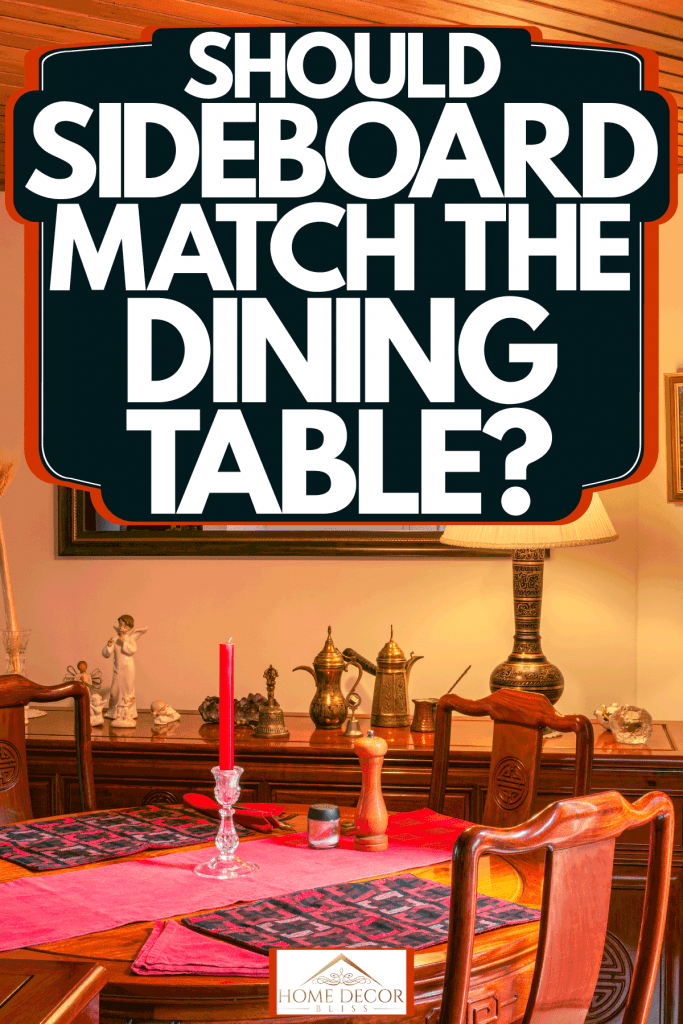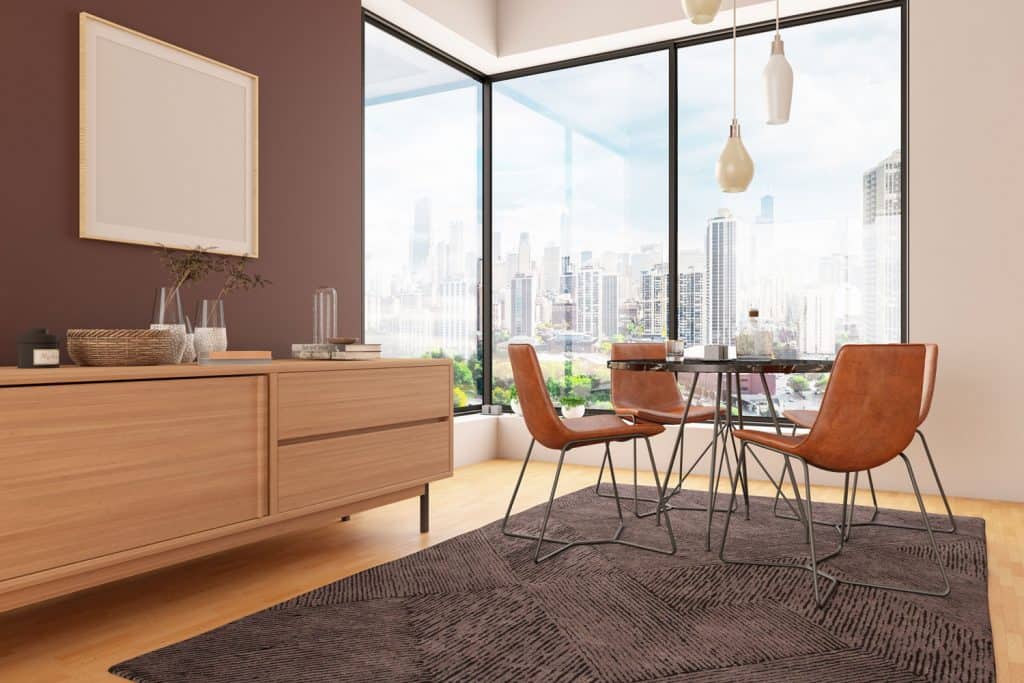The dining room in your home is a place where you likely spend a lot of time with friends and family, so you want it to be as attractive and practical as possible. When it comes to storage space in the dining room, nothing beats having a sideboard. But what do you do if you have an older dining room table and you'd like to buy a sideboard that's a different color or style? Can you mix and match the furniture? We take the guesswork out of dining room decorating because our research has found all of the information you need to create a perfect dining room.
Your sideboard does not need to match your dining room table. Decorating experts agree that attempting to match all of your furniture is outdated, and instead, you can decorate with pieces that differ in style and color for a bold, eclectic look.
If you are someone who likes to go against the grain when it comes to decorating, and you prefer to mix and match with furniture pieces, then stay tuned for all you need to know about choosing the right sideboard for your dining room.

Do The Dining Table And Sideboard Need To Match?
Before we answer that question, let's explain what a sideboard actually is. A sideboard is a piece of furniture that is typically placed along the wall in your dining room. It's rectangular in shape, and it holds dishware, silverware, linens, and anything else you might need in your dining room.
Sideboards aren't just practical, though. You can also use your sideboard to showcase decorative items to create an elegant and quite trendy look.
Not A Match
It's tempting to try and coordinate all of your furniture, but according to the experts, there's no need for that. Furniture doesn't have to be perfectly matched to look chic and attractive.
In addition, it's often difficult to find pieces that match, especially if you don't buy all of the pieces at the same time. Trying to coordinate pieces can also be expensive, so if you're on a budget, a mismatched room might be more to your liking.
Size And Style Similarities
There are a few ways to make sure that your pieces complement each other. First, you can get a sideboard that is the same style as your dining room table. For instance, if your table is modern, then you could opt for a modern sideboard even if they don't match.
Another option is to choose furniture with colors in the same family, or you can match some aspects of the pieces. If you have a dining room table with chairs that have grey cushions, you might coordinate with a grey sideboard. Choosing colors or wood that complement each other is another way to create a bit of unity with mismatched pieces.
Daring And Different
If you come upon a sideboard that you love and it doesn't quite go with your existing decor in any way, shape, or form, the experts say to just go with it. The practice of decorating with mismatched pieces has become fashionable in recent years. You'll create an eclectic look in your dining room with your bold choices, and you'll showcase your own creativity.
Choosing The Right Sideboard
We sometimes add affiliate links and content that was curated and created by our team with the help of advanced ai tools to help showcase the best design styles.

The standard for choosing the right sideboard is up to you. One important factor to influence your choice is the size of your dining room. If you have a small space, obviously, you'll need a smaller sideboard so that you are not squeezing around furniture in your dining room. Make sure that you have enough room to walk and pull out your dining chairs.
Practicality
Being practical when it comes to size might mean passing up a larger sideboard that would coordinate with your existing dining room table, but you simply don't have the room for it. That's another reason why it's often difficult to find coordinating pieces.
Storage
The amount of storage you need should also come into play when choosing a sideboard. If you are looking for a piece of furniture that really goes the distance as far as storage, make sure that the sideboard you choose contains a lot of cabinet space rather than one that is more decorative in nature.
Aesthetics
Ultimately, you will want to buy a sideboard that you find pleasing to the eye since this will likely be a piece of furniture that you will be looking at for years to come. So above all else, opt for a sideboard in a style and color that you love.
Click the link to view this modern farmhouse-style sideboard on Amazon.
How Long Should A Sideboard Be In A Dining Room?
Most decorators agree that a sideboard in your dining room should be about 60 inches. The reason for this is that food is often placed on the sideboard before it is served, so you will want to have plenty of room. You can also use your sideboard to display various accents or personal items, so a longer area will allow you more room for trendy accessories.
However, if you have a smaller dining area, a sideboard that is not as long is perfectly acceptable. The size of your dining room should ultimately have the final word on how big your sideboard is since you don't want a huge piece of furniture in a tiny space.
Click here to view this small sideboard on Amazon.
How Do You Style A Sideboard In A Dining Room?
When decorating your sideboard, you can let your creativity go wild. If you are looking to create a traditional feeling in your dining room, family photos and heirlooms will look lovely on your sideboard. For a more modern vibe, pair an abstract painting with trendy accents.
There are countless other ways to dress up your sideboard. Plants or flowers are a classic way to add color, and a nice lamp will look great in addition to being useful.
Vases, fruit bowls, and candle holders are also popular items to include in your sideboard decor. You can also use the top of your sideboard to display wine bottles.
Click the link to see these decorative vases on Amazon.
Balance
Experts advise that when you decorate your sideboard, you should try to achieve balance. Avoid placing too many items on one side and keep things coordinated with color schemes.
Also, don't overcrowd your sideboard. Your decorative pieces should create an understated elegance, and too many pieces can take away from their charm.
What Is The Difference Between A Buffet And A Sideboard?
There is a lot of confusion regarding the difference between a sideboard and a buffet, and to be quite honest, the answer depends on who you ask. Some designers say there is no difference between the two, and the terms are used interchangeably.
Many times, the word buffet is used to describe a piece of furniture that is located in the dining room, while the word sideboard is the term for the same piece of furniture located in the living room. Some say there are also differences in the appearance of buffets and sideboards.
Sideboards are said to have shorter legs and often have cabinets that extend to the floor. Buffets are described as having longer legs than sideboards.
Click here to see this buffet on Amazon.
Final Thoughts About Sideboards
Sideboards are not only practical storage solutions, they are a sophisticated addition to any dining room. The perfect sideboard doesn't need to match your dining room table, as we have discovered. You can choose your sideboard based on your personal tastes and create a room that's stylish and attractive.
If you enjoyed this post and you'd like to read more great articles about sideboards, check out these links below!
How Much Does A Sideboard Weigh?




